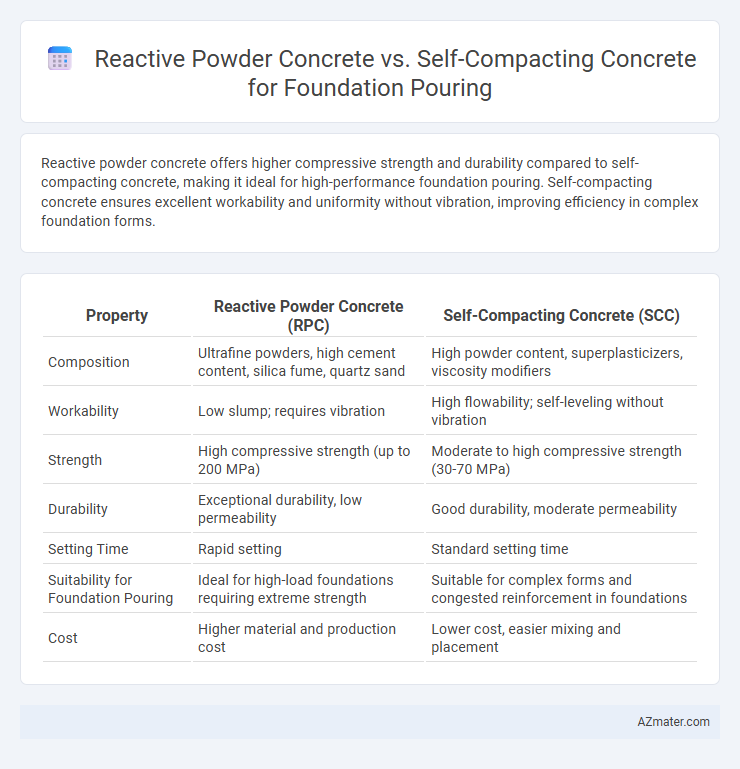Reactive powder concrete offers higher compressive strength and durability compared to self-compacting concrete, making it ideal for high-performance foundation pouring. Self-compacting concrete ensures excellent workability and uniformity without vibration, improving efficiency in complex foundation forms.
Table of Comparison
| Property | Reactive Powder Concrete (RPC) | Self-Compacting Concrete (SCC) |
|---|---|---|
| Composition | Ultrafine powders, high cement content, silica fume, quartz sand | High powder content, superplasticizers, viscosity modifiers |
| Workability | Low slump; requires vibration | High flowability; self-leveling without vibration |
| Strength | High compressive strength (up to 200 MPa) | Moderate to high compressive strength (30-70 MPa) |
| Durability | Exceptional durability, low permeability | Good durability, moderate permeability |
| Setting Time | Rapid setting | Standard setting time |
| Suitability for Foundation Pouring | Ideal for high-load foundations requiring extreme strength | Suitable for complex forms and congested reinforcement in foundations |
| Cost | Higher material and production cost | Lower cost, easier mixing and placement |
Introduction to Modern Concrete Technologies
Reactive powder concrete (RPC) and self-compacting concrete (SCC) represent advanced materials in foundation pouring, offering superior durability and workability compared to traditional concrete. RPC is characterized by its ultra-high strength and dense microstructure achieved through fine powders and silica fume, making it ideal for heavy-load foundations requiring enhanced compressive strength and reduced permeability. SCC, known for its excellent flowability and ability to consolidate under its own weight without vibration, is preferred in complex foundation forms and congested reinforcement layouts, ensuring uniform compaction and minimized voids.
Overview of Reactive Powder Concrete (RPC)
Reactive Powder Concrete (RPC) is an advanced cementitious material known for its ultra-high strength, durability, and enhanced microstructure achieved through fine powders, silica fume, and steel fibers. It offers superior compressive strength exceeding 200 MPa and exceptional resistance to chemical attacks, making it ideal for foundation pouring in demanding environments. The dense matrix of RPC minimizes porosity and shrinkage, resulting in long-lasting, high-performance structural foundations compared to traditional concrete types.
Understanding Self-Compacting Concrete (SCC)
Self-Compacting Concrete (SCC) for foundation pouring offers superior flowability and deformability without segregation, enabling it to fill complex formworks and densely reinforced sections efficiently. SCC's high viscosity and self-leveling characteristics reduce the need for mechanical vibration, improving labor efficiency and minimizing noise on-site. Compared to Reactive Powder Concrete (RPC), SCC emphasizes ease of placement and durability, making it ideal for robust foundational structures requiring consistent compaction and high-quality surface finishes.
Key Material Properties Comparison
Reactive powder concrete (RPC) exhibits ultra-high compressive strength typically exceeding 200 MPa and exceptional durability due to its low porosity and optimized particle packing, making it ideal for foundations requiring high load-bearing capacity. Self-compacting concrete (SCC) offers superior flowability and segregation resistance with a slump flow of 650-800 mm, ensuring effective placement in complex formworks without mechanical vibration. While RPC excels in mechanical performance and longevity, SCC provides enhanced workability and faster construction efficiency, both being crucial depending on foundation design priorities.
Workability and Placement Efficiency
Reactive powder concrete (RPC) offers exceptional strength and durability but requires precise mixing and vibration for placement, which can reduce workability in foundation pouring. Self-compacting concrete (SCC) excels in workability and placement efficiency, flowing easily into complex formworks without mechanical vibration, ensuring uniform compaction and significantly reducing labor time. For foundation pouring, SCC's superior flowability minimizes voids and enhances surface finish, while RPC's high-performance properties are preferred where extreme durability and load-bearing capacity are critical.
Durability and Longevity Factors
Reactive powder concrete (RPC) offers superior durability and longevity for foundation pouring due to its ultra-high compressive strength and dense microstructure, which significantly reduces permeability and resistance to chemical attacks. Self-compacting concrete (SCC) enhances construction efficiency and uniformity but generally has lower mechanical properties compared to RPC, impacting long-term durability under aggressive environmental conditions. Choosing RPC for foundations ensures enhanced resistance to cracking, freeze-thaw cycles, and corrosion, making it ideal for structures requiring extended service life.
Strength Performance in Foundation Applications
Reactive powder concrete (RPC) exhibits superior compressive strength, often exceeding 200 MPa, making it ideal for foundations requiring exceptional load-bearing capacity and durability. Self-compacting concrete (SCC) offers good strength ranges between 40-80 MPa, with enhanced workability ensuring uniform filling and reduced honeycombing in complex foundation forms. For foundation pouring, RPC's strength performance outperforms SCC, especially in high-stress environments, but SCC provides practical advantages in ease of placement and consistent compaction.
Cost Implications and Economic Analysis
Reactive powder concrete (RPC) offers superior strength and durability for foundation pouring but comes at a higher material cost compared to self-compacting concrete (SCC), which is designed for ease of placement and reduced labor expenses. Economic analysis indicates that while RPC reduces long-term maintenance costs due to its enhanced performance, SCC provides immediate savings through faster construction times and lower workforce requirements. Selecting between RPC and SCC depends on balancing upfront material investment against lifecycle costs and project timelines.
Sustainability and Environmental Impact
Reactive powder concrete (RPC) offers a higher strength-to-weight ratio and reduced cement content, significantly lowering CO2 emissions compared to traditional concretes, making it a sustainable choice for foundation pouring. Self-compacting concrete (SCC) minimizes energy consumption during placement by eliminating the need for mechanical vibration, reducing noise pollution and labor demands while maintaining durability. Both RPC and SCC contribute to sustainable construction by enhancing material efficiency and reducing environmental impact, with RPC excelling in material optimization and SCC in application efficiency.
Choosing the Optimal Concrete for Foundations
Reactive powder concrete (RPC) offers exceptional compressive strength and durability, making it ideal for foundations requiring high load-bearing capacity and resistance to harsh environmental conditions. Self-compacting concrete (SCC) excels in flowability and ease of placement, reducing labor and time while ensuring uniform compaction in complex foundation forms. For foundations, selecting RPC ensures superior performance in demanding structures, whereas SCC provides efficient construction with consistent quality in standard foundation applications.

Infographic: Reactive powder concrete vs Self-compacting concrete for Foundation pouring
 azmater.com
azmater.com